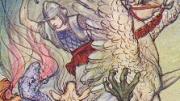"Of all childhood pastimes, reading was my passion," writes historian Arthur M. Schlesinger Jr. '38, Jf '43, in the first volume of his memoirs, A Life in the Twentieth Century: Innocent Beginnings, 1917-1950 (Houghton Mifflin, $28.95). "Now that television has replaced the book in the life of the young, mine may have been the last generation to grow up in the high noon of the print culture."
My mother gave me an appetite for books as well as a capacity to read them quickly. "Perhaps it is only in childhood that books have any deep influence on our lives," Graham Greene has well said. "...In childhood all books are books of divination, telling us about the future....What do we ever get nowadays from reading to equal the excitement and the revelation of those first 14 years?" To which I would add that most people will have done most of the reading they will ever do by the age of 25 and must live off those books for the rest of their lives.
My mother began with fairy tales, the Brothers Grimm and Hans Christian Andersen; with Greek and Roman mythology, especially as marvelously rendered by Hawthorne in A Wonder-Book and Tanglewood Tales; and with the wondrous Arabian Nights. When I began to read for myself, a six-volume series called My Book House came into my life, an entrancing and resplendently illustrated anthology of historical adventure, fairy tale, poetry, mythology, something for every mood and moment.
I fear that such an initiation into a larger world would be much condemned today. For these were all tales filled with cruelty and violence, mutilation and murder, magic and fantasy, streaked by what is now seen as classism, sexism, racism and superstition. Approved children's books today are by contrast didactic in intent, dealing with prosaic, everyday events and intended to improve relations among classes, sexes and races. Such books, it is argued, lead children to face reality rather than to flee into fantasy.
Is this really so?...
Childhood is finite. So is the number of books one can read. Why spend time on a modern morality tale in which the girl plays doctor and the boy plays nurse and their patient is the black child down the block when you can read about Huck and Tom and Nigger Jim? The serious point of children's books is not to improve behavior but to expand imagination. Great children's literature creates new worlds that children enter with delight and perhaps with apprehension and from which they return with understandings that their own experience could not have produced and that give their lives new meaning.
The classical tales have populated the common imagination of the west. They are voyages of discovery. They introduce children to the existential mysteries--the anxiety of loneliness, the terror of rejection, the need for comradeship, the quest for fulfillment, the struggle against fate, victory, love, death. "Small children," Henry James observed in his preface to What Maisie Knew, "have many more perceptions than they have terms to translate them." The classical tales tell children what they unconsciously know--that human nature is not innately good, that conflict is real, that life is harsh before it is happy--and thereby reassure them about their own fears and their own sense of self.






